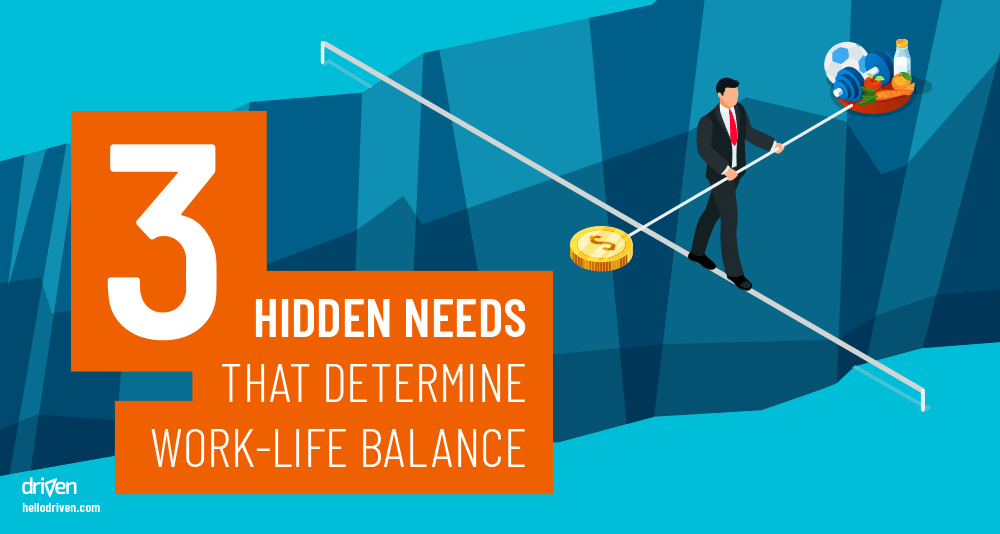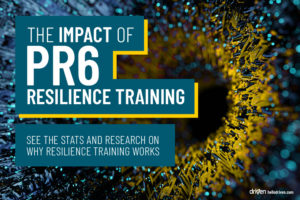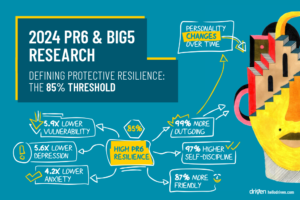“Work-life balance” causes a lot of discussion and debate. Working professionals can spend their lives chasing the perfect balance. However, the idea of work-life balance is a myth – research does not support this as a sustainable concept on which to base your life around. Work is a part of life in a deep and fundamental way, and the part we name “life” is clearly not just made up of leisure activities. These are not separate spheres, and the way that you think about “work life balance” is particularly important to your wellbeing and values.
We are learning a great deal about how we as human beings achieve satisfaction, and importantly, what our basic needs are at a neurological level. Exploring and understanding these basic needs brings a surprising conclusion about work life balance: it shows us what we should actually focus on. At the end of this article, I’d like you to replace the three words “work, life, balance” with three new words that you’ll find are much more useful.
The Three Basic Needs
Psychology and neuroscience have advanced significantly in the last few decades. Nobel laureate Klaus Grawe took a significant step forward by developing these into a combined field called neuropsychotherapy. By integrating our understanding of the brain into psychological concepts, neuropsychotherapy helps us understand what exactly is important to us as humans to function at our best, on a more mechanistic basis.
It’s through this integration that we find the basic human needs, namely:
connection,
control, and
motivation.
These are basic needs that are fundamental to our own wellbeing and have evolved in the brain over millions of years. This means that we can’t just ignore or dismiss these needs. If we try to ignore them, we find ourselves feeling like something is missing, a void, or emptiness. This may manifest as frustration, depression, or other disruptive mental states.
Your brain needs to have these needs fulfilled in order to function at its best. Unlike Maslow’s pyramid, these needs are not hierarchical. Instead, they function together, often simultaneously – while other times, one will be more pressing than the other. Together, these needs feed into our larger need for enhancement of our self-esteem.
Let’s explore each need.
1. Connection
We have evolved as social creatures, using the power of connected communities to survive in the harsh pre-historic world. Advanced species (like chimps and apes) form complex communities with hierarchical structures, a leader, and various roles. These complex communities allow for better protection of the group and its individuals, thus increasing the chance of survival. This is how we have evolved as well – resulting in a deeply ingrained desire for connection with other people.
Whether with family, through friends, or at work, the brain desires to be part of social groups and communities. Sharing, supporting, giving, and receiving are all part of our desire for connection. Even the simple act of helping someone else has been proven through studies to improve our own satisfaction and wellbeing.
With the modern day, post-industrial understanding of “work”, this need for desire can raise a crucial challenge – what if we aren’t getting a sense of connection at work?
If we feel disconnected from others at work – if the office is simply a place we come to perform a task, then leave – it means that there is a critical need that isn’t met. This is crucial because many of us spend at least half – if not the majority – of our day at work.
However, we can form friendships at work and enjoy the connection of those around us. Finding ways to connect at work through building support networks can meet this need of the brain, and in turn increase your satisfaction at work. Connection increases your resilience, allowing you to not let little things bother you, as well as deal more effectively with stress. The key is to connect with people who are a positive influence, helping you avoid negative spirals, and helping each other on a path of improvement.
Finding ways to connect at work through building support networks can increase your satisfaction at work
2. Control
The need for control is about having a sense that you are in charge of your own destiny. It includes having goals and a vision towards which you are working – a sense of orientation. This is due to our deep desire for a sense of purpose and meaning, which transcends a desire for happiness since it drives us to keep working towards what is meaningful to us, even when things get tough.
It’s not about controlling every aspect of your life or becoming a ‘control freak’. Instead, it is about having a realistic set of options available to us, where we can choose to pursue our goals. When we find ourselves pushed into a direction we don’t want to go – with no other option – then we feel out of control. This may happen at work where job descriptions change, or the nature of the work changes, and you are expected to simply adapt.
It’s important to be clear with what we actually want and what our own long-term goals are. This helps avoid confusion during this time, since we can put things into perspective with our own vision. Taking a step back and putting changes in our environment into perspective with our goals may illuminate opportunities to advance, giving us back a sense of control.
A big factor in our success in meeting our need for control is our own ingenuity and willingness to take calculated risks. The reality is that there are more options available to us than ever. Information is available to us in an almost unlimited quantity, so it’s up to us to recognise how much freedom we have. We need to remain willing to take chances and pursue new directions to live our purpose.
It’s important to be clear with what we actually want and what our own long-term goals are.
3. Motivation
Somewhat unsurprisingly, we have a fundamental need to do more of what we enjoy, and less of what we don’t. In a sense, it is about maximising pleasure and avoiding pain, but what really brings this to life is motivation. This comes from the very early days of the evolution of the brain where pain and fear developed as a mechanism to avoid danger, such as poisonous foods, or the sight of a predator. Pleasure developed as a mechanism to identify things useful for survival, such as foods high in sugar or mating. Each of these primal emotions pushes us take some type of action – for example, to eat more, or run away.
At work we have a desire to be engaged in what we do. Imagine waking up and wanting to go to work. Being that motivated by what you’re doing means that you are driven to get up and go to work. To some this may seem like an entirely foreign concept, as work is simply not to be enjoyed and it’s just something that pays the bills. But it is possible. Work may not be something you outright enjoy, but you may well enjoy the challenges you face, enjoy the connections you make, enjoy learning new skills, etc. These are things that can be motivating to us. Too often we only find motivation in things outside of work, like that new restaurant to try, movie to watch, or game to play. But what if you could enjoy the challenge of work as well?
It’s not the job of someone else to motivate us, but instead most of the work is up to us to motivate ourselves. We must be willing to consider that what we do is worthwhile and important, in whatever large or small way. It’s up to us to decide that we will put in our best and strive to do a little bit better each time. We can focus on the elements we do enjoy and maintain perspective so we can look beyond what we don’t enjoy. Setting realistic aspirational goals for yourself at work is a reliable way to motivate yourself, while at the same time improve skills and grow as a person.
Being that motivated by what you’re doing means that you are driven to get up and go to work.
It’s not about balance
What you might have noticed through the three needs is that it is possible to meet each need through work. It is not necessarily the case that these needs can only be met by leisure activities. Instead, we can focus our thinking, behaviour, and expectations so that our needs are met through the work that we do every day.
When we can meet our basic needs through work, the brain functions at its best and you get the feeling of fulfilment and satisfaction. This is conducive to high performance and advancement in your career, as you will naturally give your best. What’s remarkable is that when your needs are met in this way, you can push yourself harder at work without experiencing burnout. It builds your resilience and ability to perform sustainably at a high level.
On the other hand, if one or more of these needs are not met at work, then you can feel like things are out of “balance”. You might then feel like you need to cut back on work and stress, but the real answer is in checking which of your needs are not met, and addressing those at work. The idea of balance focuses you on the wrong concept. Therefore, we need to change our vocabulary.
Update your vocabulary
So, take a moment to replace the three words “work, life, balance” with “connection, control, motivation”. Whenever you think of work life balance, think instead of connection, control and motivation, and you’ll find a much more useful way to achieve work satisfaction. Investigating these three needs is much more reliable in determining what is missing from your current work environment, and gives you specific areas to work on.
All these needs are supported through the six domains of resilience:
Connection – Supported by Collaboration and Composure
Control – Supported by Vision, Composure and Reasoning
Motivation – Supported by Vision and Tenacity
These are all also supported by Health, since your own physical health determines your ability to engage in mental pursuits and chase your goals.
When we provide resilience training, we build skills across each of these six domains so individuals can discover ways to meet their basic needs and function at their best. Sometimes this is about changing perceptions and beliefs, while other times it is about building new skills. The result is an ability to accurately diagnose what needs to change and put in place a realistic plan to improve the situation.
Using this neurological model is a far more productive approach to achieving satisfaction at work. Try it out – change your vocabulary and you might find the way forward becomes a lot more intuitive.
Stay resilient,
Jurie



